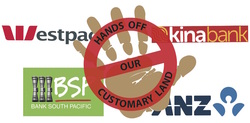In a Post-COVID world govt must drop plans for bankable customary land
With the COVID-19 pandemic still expanding across the globe, ACT NOW is urging the PNG government to drop its plans to put customary land into the hands of commercial banks.
The COVID-19 crisis has demonstrated once again that customary land is a vital and irreplaceable resource for our families and communities.
It should be inconceivable that the government would put customary land at risk by allowing commercial banks to hold the title as security for financial loans.
Customary land supports an economy worth K40 billion a year and sustains whole communities by providing them with food, building materials and incomes.
When the widely promoted import and export economy recently collapsed, it was customary land that withstood the food demand, providing the whole nation with a safety net.
Yet, under pressure from commercial banks, the government wants to allow customary land to be used as security for loans.
This is a foreign and dangerous idea that is completely incompatible with the notions of community custodianship and PNG ways.
To try and justify the government's move, the Secretary for Lands has claimed that people need loans to improve their standard of living.
This is just dangerous nonsense. Loans are not free money; if an individual or their family were unable to repay a loan in the future, whether because of sickness or other unseen events, the banks could step in and take their land.
This could deprive not only that family but a whole community and unborn generations of their land; making them homeless and destitute.
The government has already said that problems of a shortage of urban land around our towns and cities and land for resettlement can be addressed through existing State leasing mechanisms and has pilot projects already underway.
The issue of making customary land bankable is a completely separate matter and it is one where the commercial banks must back off.
The banks have to realise that land in Papua New Guinea is an entirely different concept from land in Australia, Europe and the United States. It is not owned and cannot be traded by individual families and it sustains not only our rural people but our whole economy.













